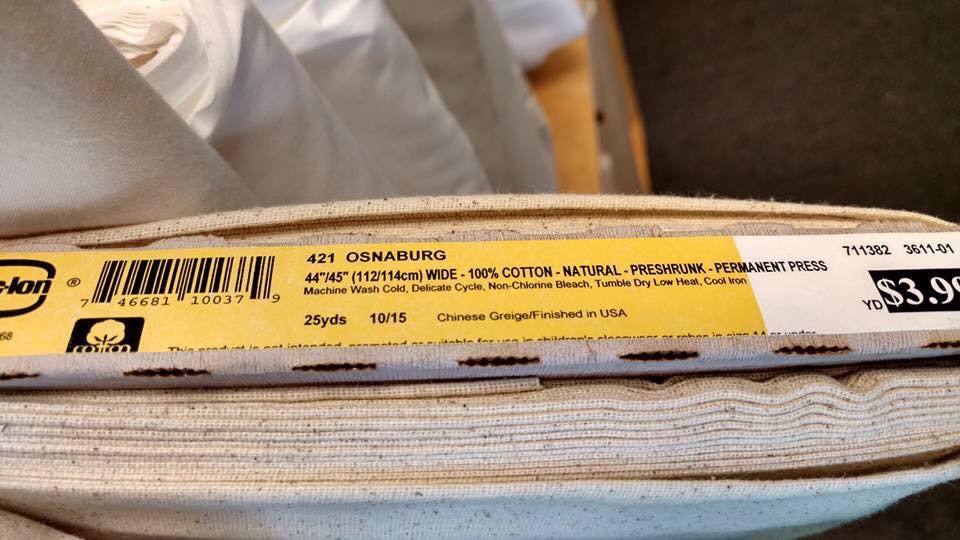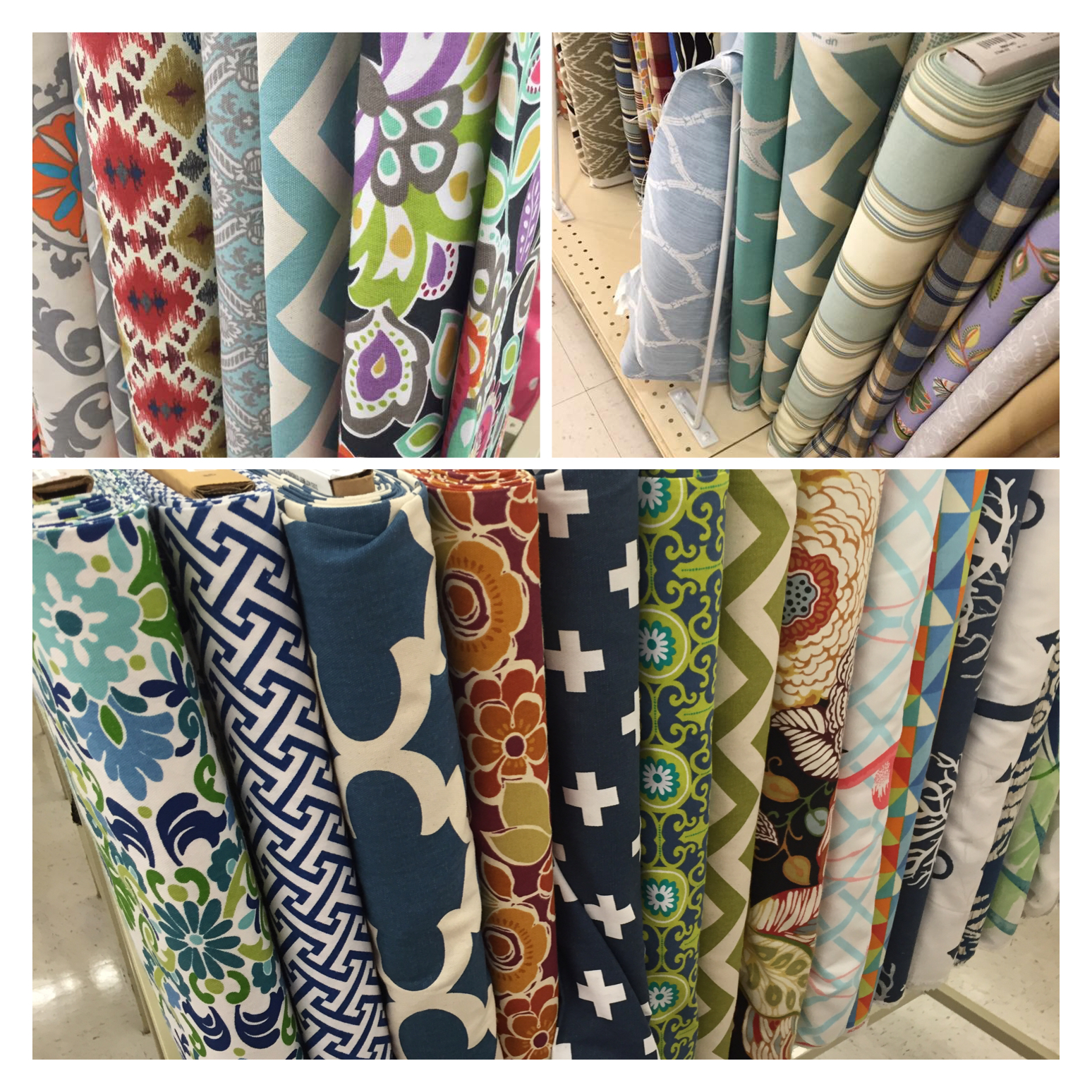Where to Find Babywearing Materials: USA
This list is just a start for some of the most common materials needed for DIY Babywearing. None of these sources are guaranteed, and this isn't a comprehensive list. This is simply a list of suggestions from the members of our Facebook groupMaterials Covered
- Osnaburg
- Duck Cloth
- Bottomweight Linen
- C&C
- Tablecloths
- Athletic mesh
- Sling Rings
- Webbing & Buckles
- Foam for shoulder padding
Osnaburg
 Osnaburg is a natural-colored, bottomweight muslin-like fabric. It is highly recommended for beginners because of the low cost and excellent wrap qualities once broken in. It works great for wraps and ring slings and breaths nearly as well as linen. Because osnaburg doesn't come in a lot of varieties, it is almost always an excellent choice, and the bolt tags are always clearly labled (although sometimes hard to find.) The only thing to look out for is "J Thompson" brand osnaburg, which has a reputation for being much thinner than other brands and less desireable. Roc-lon is the brand most people use and love. Although "traditional" osnaburg is made from linen, most of the osnaburg available in stores is 100% cotton.
Osnaburg is notoriously difficult to find outside of the USA. Heavyweight calico is probably the easiest to find and most comparable fabric. Unlike osnaburg, however, calico comes in a wide variety of weights, so make sure what you are buying is thick enough.
Sources:
Osnaburg is a natural-colored, bottomweight muslin-like fabric. It is highly recommended for beginners because of the low cost and excellent wrap qualities once broken in. It works great for wraps and ring slings and breaths nearly as well as linen. Because osnaburg doesn't come in a lot of varieties, it is almost always an excellent choice, and the bolt tags are always clearly labled (although sometimes hard to find.) The only thing to look out for is "J Thompson" brand osnaburg, which has a reputation for being much thinner than other brands and less desireable. Roc-lon is the brand most people use and love. Although "traditional" osnaburg is made from linen, most of the osnaburg available in stores is 100% cotton.
Osnaburg is notoriously difficult to find outside of the USA. Heavyweight calico is probably the easiest to find and most comparable fabric. Unlike osnaburg, however, calico comes in a wide variety of weights, so make sure what you are buying is thick enough.
Sources: - Katipatch
- Spotlight
- Everything Fabric
- Lincraft (source for heavyweight calico)
Duck Cloth
 Duck cloth is a 100% cotton fabric similar to canvas. It is a great choice because even very lightweight duck is heavy enough to be safe. Duck comes in a variety of weights, all the way up to 18oz per square yard (for purposes such as sandbags and hammocks) but most of the duck cloth sold in stores will be closer to the 5-7oz variety. Printed/patterned duck is typically closer to 5oz (185 gsm.) Solid colored duck at most stores is usually sold as "duck canvas" and is stiffer and heavier, but will eventually break in to be usable.
Sources:
Duck cloth is a 100% cotton fabric similar to canvas. It is a great choice because even very lightweight duck is heavy enough to be safe. Duck comes in a variety of weights, all the way up to 18oz per square yard (for purposes such as sandbags and hammocks) but most of the duck cloth sold in stores will be closer to the 5-7oz variety. Printed/patterned duck is typically closer to 5oz (185 gsm.) Solid colored duck at most stores is usually sold as "duck canvas" and is stiffer and heavier, but will eventually break in to be usable.
Sources: - Spotlight (near the upholstery fabrics)
- Ikea - while not specifically labeled as duck, most of their fabric has the weight listed and is appropriate to use.
Bottomweight Linen
Linen (the fiber made from flax plants; not to be confused with "linens" like bedsheets or "linen-like" fabrics like rayon) is an incredibly strong fabric and the gold standard for breathability in the heat. It takes a little work to break it in and soften it and tends to crease a lot, but is generally a well recommended fabric for any project. Sources:- Lincraft
- Spotlight
- Ikea (Aina fabric - 240gsm, $12.99/m)
Colimašon et Cie
C&C is a French company that sells woven wrap material by the meter. This is your best option for a DIY that will feel exactly like a purpose-woven wrap, because it essentially is. It is also great for making soft structured carriers and mei tais that will feel like wrap conversions. Source:Tablecloths
Tablecloths are a great budget option that are typically cheaper than fabric by the yard. A jacquard woven tablecloth will feel nearly identical to a woven wrap: nice and floppy, cushy and breathable. A printed tablecloth, so long as it is an appropriate thickness, will be similar to working with duck cloth. Sources:- Trade Secret
- Spotlight
Athletic Mesh
Athletic mesh for water wraps and slings can be tricky to find. Make sure you are buying the right stuff. Not utility mesh, athletic knit, wicking mesh, etc. Sources:- The Fabric Store
- Spotlight
Sling Rings
Rings for ring slings, onbuhimos and other carriers need to be weight tested and smooth. While it is possible to find rings at a hardware store with proper weight rating and a smooth weld, these will likely be at least triple the weight of an equivalent aluminum sling ring and even a smooth weld can eventually wear a weak spot in your fabric. If at all possible, it is always preferable to use a ring that is designed for babywearing. NEVER use rings purchased from a craft store. Sources:- Frangipanibaby
- Karri Tree Lane
- The Sleepstore
- Woven (NZ)
Webbing & Buckles
Webbing and buckles for SSCs should always be weight tested! Sources:- BestBuckle.com
- Anaconda
- Woven (NZ)
- Super Cheap Auto
- Army supply stores
- DDC Australia
Foam Padding
A lot of people use foam, yoga mats, or fleece for padding the straps of their structured carriers. Sources:- Wool blanket from the op shop
- Open celled foam from Clark Rubber
- Woven (NZ)
Topic revision: r2 - 2016-07-26 - AlyssaLeonard
Ideas, requests, problems regarding TWiki? Send feedback

